 Leading Blog | Posts by Category |
 Leading Blog | Posts by Category |
10.10.23

quickpoint: Responsibility Develops Power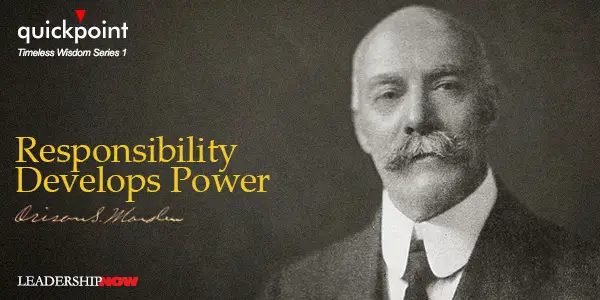
IN AN ESSAY published in 1908, Orison Swett Marden encourages leaders to give responsibility to their employees—to develop leaders at all levels. Give power so that others may grow. Below are thoughts adapted from that essay that are as relevant today as they were when they were written.

Posted by Michael McKinney at 09:08 AM
08.16.23

Do You See Me?
PEOPLE want to feel seen. We all do. We want to know, “Do I matter?” We want to know that the leader is invested in us. As leaders, it becomes a matter of how we treat others. Do we include them in meaningful action? Do we listen? Do we care about their future? Leaders who have a developmental focus make others feel seen. Interactions are not seen as transactional. In The Extraordinary Power of Leader Humility, Marilyn Gist states, “Developmental focus implies long-term thinking. You care about the whole person and his or her progress beyond what is merely useful to you.” She explains: The power you can hold can be used to support others’; growth, neglect it, or sabotage it—and they are aware of this. Your role as a leader can and should involve helping them in many ways, such as understanding the values of your specific organizational culture, how to do their job better, how to improve their knowledge of the context in which you operate so they have a better chance to advance, and how to manage others. Barbie Brewer was hired at IBM in her early twenties to manage the internship program in eleven western states. She writes in Lead and Let Live, “The job at IBM also represented the first time a company invested in me, that is made me feel a valued and valuable member of the team. They flew me out to their headquarters in White Plains, New York, for extensive training, taking a chance on this rookie because they saw something in me that I hadn’t yet seen in myself. Leaders, listen up: investing in your young people and giving them solid training is the smartest thing you’ll ever do.” In a similar way, when I was 22, I worked for Hughes Helicopters as a Cash Management Analyst. At the time, our multi-million-dollar contracts were paid monthly with mailed checks. The impact on our cash flow and potential overnight investments was huge. They sent me to Warren, Michigan, to work with the Department of Defense to streamline the monthly payment process of our AH-64 Apache Advance Attack Helicopter development. They also sent me to New York to do the same with the governments of Israel and Kenya to streamline their payments for other helicopter programs. Their trust in me expanded my capacity and built my confidence and commitment to Hughes. It is important for leaders to give others the space to think for themselves and take the initiative in the parameters of the culture. No one knows it all, and we dignify and value others by including and stretching them. To do this is to believe that everyone is valuable enough to contribute to the organization’s success. Before we can truly lift others up, we need to examine our beliefs about other people. How we regard ourselves in relation to others will determine how we treat them in the long run.
Posted by Michael McKinney at 06:44 AM
08.14.23

Get Out of Your Own Way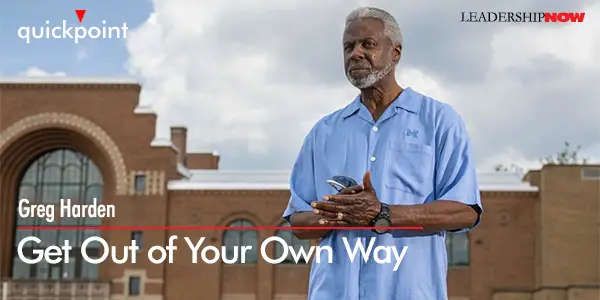
RETIRED University of Michigan, Director of Athletic Counseling Greg Harden asks us to learn how to get out of our own way. Stop for a moment and think about your own life. What’s holding you back? How often are you… … your own worst enemy?
Be honest with yourself about what’s holding you back. “This will only increase your commitment to the ultimate mission: Learn how to control the controllables. Practice, train, and rehearse controlling your own thoughts and actions.” You are the only person who has control over your own mind. Commit to staying out of your own way every day. 
Posted by Michael McKinney at 06:51 AM
11.19.19

quickpoint: Leaders Build Faith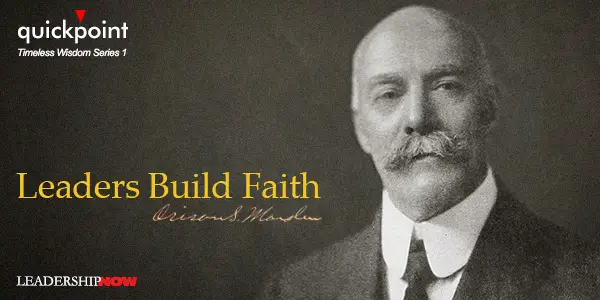
THE JOB of a leader is to build faith. The New Testament says that faith is confidence in what we hope for and conviction about what we do not see. It is the confident assurance that something we want is going to happen. In short, faith is the belief in the realization of vision. Jonathan Swift said that “vision is the art of seeing the invisible.” Faith is the belief that it will happen. The process is to separate the important from the peripheral—to lift people from their present reality to a future possibility. Embracing a vision is an act of faith. Without it, there is no reason to pursue it. Faith is like trust and based on it, but I would suggest that it is more than that. Faith is trust infused with passion. It drives us forward. Faith changes our behavior generally and how we interact with others specifically. While virtually invisible, faith is powerful. It is what brings life to leadership relationships. Leaders with great power also have great faith and build that faith in others. Orison Swett Marden, author, and founder of SUCCESS magazine elaborates on the importance of faith in any endeavor: Faith is the best substitute for genius; in fact, it is closely allied to genius.
Posted by Michael McKinney at 08:44 AM
11.11.19

quickpoint: He Can Who Thinks He Can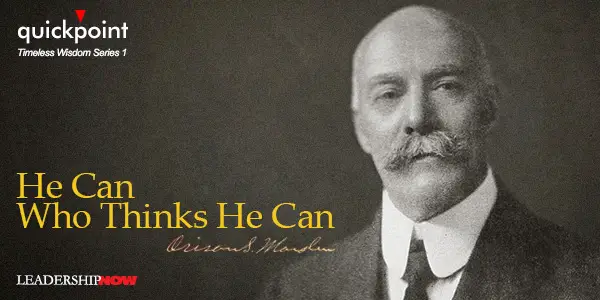
WE ALL POSSESS some confidence, but we all could use more of it. Confidence is about managing your self-doubt in order to do what you need to do to achieve your long-term goals. Confidence is a matter of mindset and belief and is reinforced by action. A chief characteristic of confident people is resilience—the ability to bounce forward in the face of struggle or disruption. Our thoughts matter. As the old saying goes, success breeds success. As we act in spite of our doubts, we build the confidence to carry on. Doubt creates even more paralyzing doubt. It is a vicious cycle you want to avoid. Fear and doubt are countered by positive thoughts and a belief that we will succeed if we try. Confidence can morph into arrogance. And we want to avoid that because it limits our potential. It puts a lid on our growth. What helps us to prevent arrogance is teachability. Teachability is the understanding that there is always more going on than we think. Curiosity suppresses arrogance. Orison Swett Marden, author, and founder of SUCCESS magazine writes this about defeating fear and doubt in his 1908 book, He Can Who Thinks He Can: How long will it take a person to become successful who puts themselves in an atmosphere of failure and remains in it until he or she is soaked, saturated, with the idea? How long will it take a person who depreciates themselves, talks failure, thinks failure, walks like a failure and dresses like a failure; who is always complaining of the insurmountable difficulties in their way, and whose every step is on the road to failure, how long will it take them to arrive at the success goal? Will anyone believe in them or expect them to win?
Posted by Michael McKinney at 07:49 AM
11.13.18

quickpoint: Artificial Intelligence and What is an Entrepreneur
“Technology doesn’t solve humanity’s problems. It was always naïve to think so. Technology is an enabler, but humanity has to deal with humanity’s problems. I think we’re both over-reliant on technology as a way to solve things and probably, at this moment, over-indexing on technology as a source of all problems, too.” CEO of Google, Sundar Pichai in New York Times, 11.08.18
Posted by Michael McKinney at 10:19 AM
05.06.15

quickpoint: Generosity Creates Loyalty “There are few things in the world that will change someone’s opinion of you as quickly as generosity” says Jon Acuff in Do Over. “There are few things in the world that will change someone’s opinion of you as quickly as generosity” says Jon Acuff in Do Over.
You will go to bat for people who have shown you generosity. Your employees will work harder. Your clients will return more often. When you are down, people will look for opportunities to pick you up.
Posted by Michael McKinney at 11:19 PM
12.18.14

quickpoint: Strategy and Leadership WHEN confronted by “unusual uncertainty” as Ben Bernanke put it, leaders need to be able to think and act adaptively. It’s jazz—strategic improvisation. Professor David Teece of University of California Berkeley Hass School of Business shares this in the foreword of Winning the Long Game: A firm’s dynamic capabilities rest on two pillars: (1) the vision and leadership skills of managers, and (2) the cohesion and flexibility of the organization as a whole. Leaders must fashion sound strategies for the enterprise, and the organization itself must be agile enough to adapt as required. An organization’s culture and values are much slower and more difficult to change than its structure or processes, and can hamstring even an excellent strategy if its leaders cannot show the way forward. 
Posted by Michael McKinney at 07:45 PM
12.11.14

quickpoint: Napoleon on Self-Control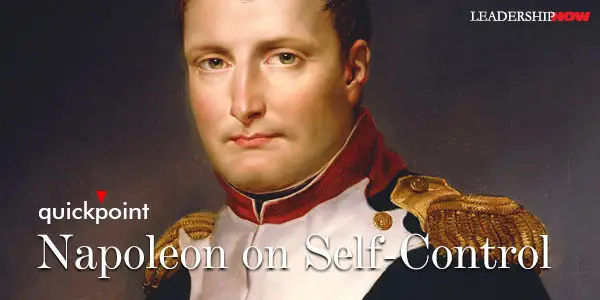
In my own case it’s taken me years to cultivate self-control to prevent my emotions from betraying themselves. Only a short time ago I was the conqueror of the world, commanding the largest and finest army of modern times. That’s all gone now! To think I kept all my composure, I might even say preserved my unvarying high spirits … You don’t think that my heart is less sensitive than those of other men. I’m a very kind man but since my earliest youth I have devoted myself to silencing that chord within me that never yields a sound now. If anyone told me when I was about to begin a battle that my mistress whom I loved to distraction was breathing her last, it would leave me cold. Yet my grief would be just as great as if I had the time. Without this self-control, do you think I could have done all I’ve done? Roberts concludes: “So rigid a control on one’s emotions might seem distasteful to the modern temperament, but at the time it was considered a classical virtue. It undoubtedly helped Napoleon deal with his extraordinary reversals of fortune.” 
Posted by Michael McKinney at 12:30 AM
03.14.13

quickpoint: Learning to Lead Emerging leader, Jonathan Doochin, learned from an early age the importance of reflection and optimism, the impact of mentorship, and the potential of thinking like an entrepreneur. In a book by and about emerging leaders, Passion & Purpose, he shares this on leadership: Emerging leader, Jonathan Doochin, learned from an early age the importance of reflection and optimism, the impact of mentorship, and the potential of thinking like an entrepreneur. In a book by and about emerging leaders, Passion & Purpose, he shares this on leadership:
Each of us has the capacity to lead. Each of us, likely, has also shied away from leadership at times. We’ve been told we simply don’t have what it takes—the intelligence, the charisma, the genetics—and, too often, we’ve listened. Increasingly, however, there is more awareness among young people that all of the mysterious qualities that once defined “leadership” are not inherent, but eminently teachable. And a generation defined by increasing interconnectedness and diversity understands better than previous generations that although there are universal principles of leadership, the model for leadership is not one-size-fits-all, but should be individualized as we play to our own strengths and personalities. 
Posted by Michael McKinney at 12:01 AM
10.23.12

quickpoint: The Long Tail of Talent The labor markets are changing. With the Internet proximity is not an issue. Chris Anderson describes it this way in Makers: The New Industrial Revolution: The labor markets are changing. With the Internet proximity is not an issue. Chris Anderson describes it this way in Makers: The New Industrial Revolution:
"The Web allows people to show what they can do, regardless of their education and credentials. It allows groups to form and work together easily outside of a company context, whether this involves “jobs” or not. And these more informal organizations are much less constrained by geography; talented people can live anywhere and shouldn’t have to move to contribute." What does this mean? “The new era will not mark the end of the blockbuster, but the end of the monopoly of the blockbuster. So, too, for manufacturing. What we will see is simply more. More innovation, in more places, from more people, focused on more narrow niches. Collectively, all these new producers will reinvent the industrial economy, often with just a few units at a time—but exactly the right products for an increasingly discriminating consumer.” 
Posted by Michael McKinney at 11:39 PM
12.21.10

quickpoint: The Benefits of Hardship in Character Development Adversity and hardship contribute to character development when they cause personal reflection and introspection about a leader’s behavior and influence. Hardship can cause leaders to look inside themselves, asking questions the answers to which can result in huge learnings and behavioral adjustments. Hardship can reveal a leader’s behavioral blind spots, inconsistencies, weaknesses, personal limitations, ad ineffective or bad behaviors. Adversity and hardship contribute to character development when they cause personal reflection and introspection about a leader’s behavior and influence. Hardship can cause leaders to look inside themselves, asking questions the answers to which can result in huge learnings and behavioral adjustments. Hardship can reveal a leader’s behavioral blind spots, inconsistencies, weaknesses, personal limitations, ad ineffective or bad behaviors.
Hardship and adversity can also be cleansing. They can have a refining effect. Through suffering, the dross of one’s personality can be removed. It can cause a leader to look at personal behavioral challenges related to anger, impatience, fear, selfishness, and so on. Adversity can also produce a clearer focus and concentration on what is important in life and what is not. There is also a maturing element to hardship. Mature means being seasoned, tested, hardened, weathered, ready, and fully developed. Thus, adversity and hardships can take each of us to a higher level of character development. (Adapted from: Building Character: Strengthening the Heart of Good Leadership by Gene Klann)
Posted by Michael McKinney at 08:45 AM
10.26.10

quickpoint: Work With the Willing! Unfortunately, in any given office, 20 percent of workers live in a permanent state of resistance. Everyone knows who they are. They walk around looking pained and miserable because their worldview is that the universe is unsafe and that everyone is out to get them. They bring their poor or ambivalent attitude to every task. They get upset if you ask them to move their desks; they get upset if you change their job descriptions; offer them chocolate ice cream and you can bet they would have preferred vanilla. They’re your toughest cases. At their worst, they can be bullies. (Is there someone that works under you that you are a little afraid of? Someone you spend a lot of time trying to avoid, or whose name comes up at your dinner table more often than you would like? That’s who I mean.) At best, they’re inaccessible to you: impervious to criticism and encouragement alike, and too complacent to find another job, they present a real leadership challenge. Unfortunately, in any given office, 20 percent of workers live in a permanent state of resistance. Everyone knows who they are. They walk around looking pained and miserable because their worldview is that the universe is unsafe and that everyone is out to get them. They bring their poor or ambivalent attitude to every task. They get upset if you ask them to move their desks; they get upset if you change their job descriptions; offer them chocolate ice cream and you can bet they would have preferred vanilla. They’re your toughest cases. At their worst, they can be bullies. (Is there someone that works under you that you are a little afraid of? Someone you spend a lot of time trying to avoid, or whose name comes up at your dinner table more often than you would like? That’s who I mean.) At best, they’re inaccessible to you: impervious to criticism and encouragement alike, and too complacent to find another job, they present a real leadership challenge.
Your best performers deserve a disproportionate share of your time and attention, so put aside any anxiety you might have over playing favorites in the office. Work with the willing. (Adapted from: Reality-Based Leadership by Cy Wakemen)
Posted by Michael McKinney at 06:17 PM
10.19.10

quickpoint: The Trap of “Outside-In” Thinking To achieve an execution revolution, business leaders need to quit thinking only about solving the current problem, but, instead, think about how to build an organization that’s good at solving problems in general—building the capability that’s certain to help overcome an uncertain future. To achieve an execution revolution, business leaders need to quit thinking only about solving the current problem, but, instead, think about how to build an organization that’s good at solving problems in general—building the capability that’s certain to help overcome an uncertain future.
Today, television, books, magazines, newspapers, and the Internet keep us flooded with information about what’s going on in the world. We become preoccupied with what everyone else is doing, instead of focusing on what’s going on inside our organizations. Focusing outward makes us good at being reactive, rather than developing the ability to execute well. This is true both individually and organizationally. The Execution Revolution is in fact an internal revolution. A revolution focused on changing the way your organization functions on the inside. In other words, controlling the things we can, to be better prepared for the things we can’t. (Adapted from: Six Disciplines Execution Revolution: Solving the One Business Problem That Makes Solving All Other Problems Easier by Gary Harpst)
Posted by Michael McKinney at 12:08 AM
10.04.10

quickpoint: Getting Out of the Way Think about this: Everyone has the potential to perform better Potential is blocked by interference Interference can be reduced by focused attention Focused attention can be simply and systematically increased Alan Fine writes in You Already Know How to Be Great, that most often dramatic performance improvement does not come from gaining new knowledge; it comes from getting rid of the “interference” that gets in the way of using the knowledge and capacity we already have. “When managers or leaders become so obsessed with policies, procedures, and their own ways of doing things” they can “become disconnected from results. They begin to micromanage. They divert employees’ attention away from learning and creating and toward trying to remember and comply. What an enormous loss of possibility!” How many times have we seen this (or even participated in it)? “We have to do it this way for the sake of order and consistency.” Really? And what are you sacrificing in the process? Probably far too much. What are we putting in the way of those we lead? Fine asks, “Was it possible that much of the specific technical instruction I’d been giving my students was not only not helping them but was actually getting in the way?” Additionally, in our own growth process, we can focus so much on the techniques, the lists, and the steps of leadership that we miss the essence of leadership. The relationships. What is getting in your way? Related Interest:
Posted by Michael McKinney at 06:55 AM
09.22.10

quickpoint: The Perils of the Comfort Zone Author and pastor C. Neil Strait (1934-2003) once wrote, “The convenient way is not always the best way. It may lead through an avenue of comfort that robs us of integrity. Or it may take us through the tunnel of compromise, where our courage is weakened. And, after all, convenience is such a fleeting thing, but integrity and courage are vital ingredients for living.” Author and pastor C. Neil Strait (1934-2003) once wrote, “The convenient way is not always the best way. It may lead through an avenue of comfort that robs us of integrity. Or it may take us through the tunnel of compromise, where our courage is weakened. And, after all, convenience is such a fleeting thing, but integrity and courage are vital ingredients for living.”
Strait is right. Our comfort zone can compromise us. And if we are not careful, our comfort zone becomes our answer for everything because it becomes the mindset we operate from. Eventually it kills our curiosity, our creativity and our opportunities. What are you doing for the sake of convenience—because it's easier—that is holding you in unhealthy patterns of behavior and limiting your thinking?
Posted by Michael McKinney at 09:12 AM
|
BUILD YOUR KNOWLEDGE
 

How to Do Your Start-Up Right STRAIGHT TALK FOR START-UPS 
Grow Your Leadership Skills NEW AND UPCOMING LEADERSHIP BOOKS 
Leadership Minute BITE-SIZE CONCEPTS YOU CAN CHEW ON 
Classic Leadership Books BOOKS TO READ BEFORE YOU LEAD |
|